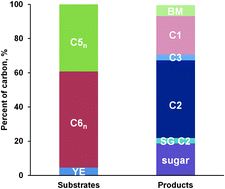
Scientists in the United States demonstrated that Caldicellulosiruptor bescii bacterium was able to degrade insoluble switchgrass biomass at 78 °C. Biomass typically needs to be pretreated with strong acids at high temperatures to break it down into usable raw materials for biofuel conversion, but current industrial pre-treatment processes are inefficient and expensive, and can pollute the environment.
Analysis of the culture after incubation with C. bescii showed that the bacterium had broken down all three components of insoluble biomass – cellulose, hemicellulose and lignin, which is notoriously difficult to degrade. No other anaerobic mircroorganism that can degrade lignin is currently known.
Read the full details of this exciting development today:
Carbohydrate and lignin are simultaneously solubilized from unpretreated switchgrass by microbial action at high temperature
Irina Kataeva, Marcus B. Foston, Sung-Jae Yang, Sivakumar Pattathil, Ajaya K. Biswal, Farris L. Poole II, Mirko Basen, Amanda M. Rhaesa, Tina P. Thomas, Parastoo Azadi, Victor Olman, Trina D. Saffold, Kyle E. Mohler, Derrick L. Lewis, Crissa Doeppke, Yining Zeng, Timothy J. Tschaplinski, William S. York, Mark Davis, Debra Mohnen, Ying Xu, Art J. Ragauskas, Shi-You Ding, Robert M. Kelly, Michael G. Hahnbdh and Michael W. W. Adams
DOI: 10.1039/C3EE40932E










